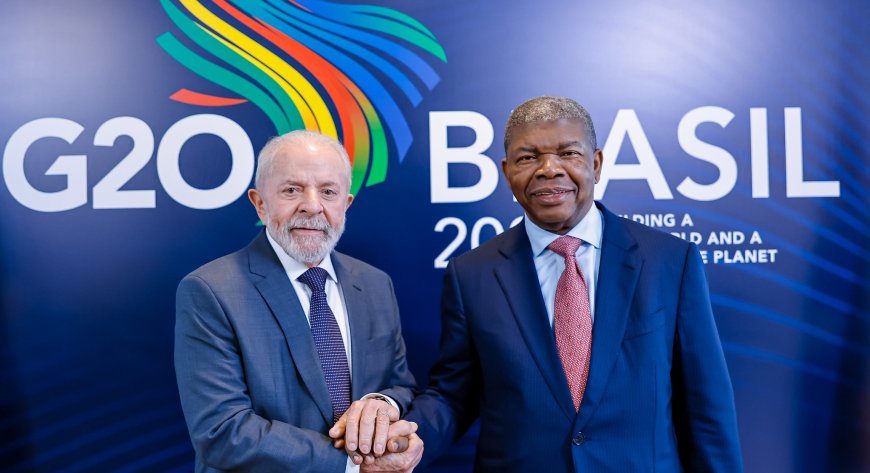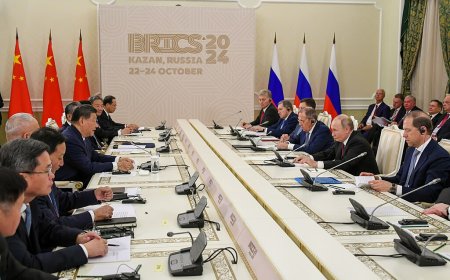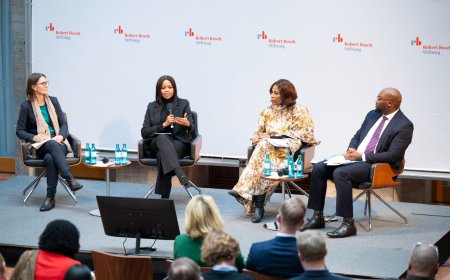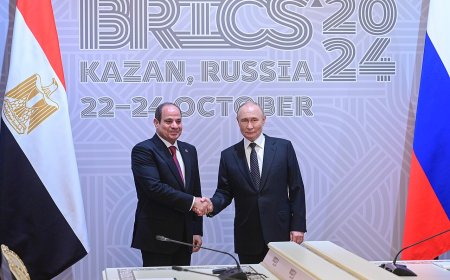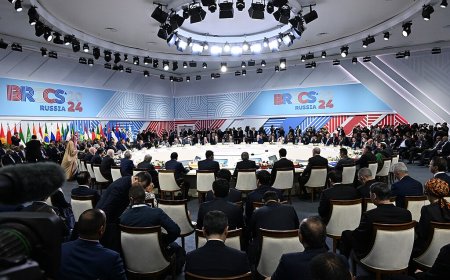Summary
- The inclusion of the AU as a Member of the G20 has the potential to be more than a symbolic changer for Africa.
- The G20 frameworks have, historically, either neglected Africa because most G20 efforts focused on advanced countries or allowed the G7 to dominate global multilateral efforts for Africa.
- The AU’s premier summit as a G20 member allowed the AU to demonstrate its suitability as a credible and representative African voice.
- The AU may face an even more significant threat from the ongoing global dynamic around tariffs, nationalism, and weakened multilateralism.
Introduction
Over the past seventy years, multilateral forums such as the G77, G24, G10, G7 and G20 have grown increasingly important in global economic governance. Unlike formal entities like the UN, these more informal committees, groups and clubs have gained relevance due to their liberal economic outlook, select membership and coordinated approaches to socio-economic challenges. Richard Haass and Charles Kupchan have suggested that these mechanisms are ideal for resolving the world’s existential crises, and they may be right. The G10 and G24 are credited for aiding the recognition of Special Drawing Rights (SDR) as a global asset, the G7 for championing climate change through the 2009 Copenhagen Accord and the G20 for negotiating a fiscal stimulus package to confront the 2008 global financial crisis. Equally, the G20’s September 2023 decision to grant the African Union (AU) permanent membership could be an ideal way for a previously underrepresented region to transform its abundant natural wealth into a sustainable economic agenda, thereby reducing poverty rates that are 6.8 times higher than the global average.
However, even if multilateralism has been an effective way to manage global burdens, the continued disproportionate control that rich nations have over entities like the World Trade Organisation (WTO) may indicate that the AU’s G20 seat may merely be a symbolic gesture designed to serve as another means for the G7 to rally emerging markets to support its agenda. Additionally, the times may not be in the AU’s favour. In its March/April 2025 edition, the periodical Foreign Affairs stated that US President Donald Trump’s second term represents a ‘renegade order’ that could irreparably fracture a global system the US has shaped and guided for the last eighty years. Thus, a threat to multilateralism may curtail the AU’s aspirations to raise Africa’s voice on the global stage. Consequently, this four-part paper examines the interaction between Africa and the G20 from 1999 to 2023, contextualises the AU’s debut at the 19th G20 Summit and gauges the institution’s capacity to secure advantages for Africa within the G20 framework. The final section proposes strategies for the AU to convert symbolism into tangible outcomes, such as a fairer global financial system, improved food security and sustainable climate change initiatives.
G20-Africa relations in perspective
On September 9, 2023, Indian Prime Minister Narendra Modi, host of the 18th G20 Summit, welcomed the AU as a permanent member of the G20. Deemed ‘a long time coming’ by former US President Joe Biden, the unanimous decision marked the first change to the G20’s membership since September 1999, when it commenced activities with the European Union (EU) and nineteen sovereign economies. This G20 decision explicitly recognised the AU as Africa’s de jure platform for member nations to rally around a continental agenda and subtly conceded that the AU had the architecture to emulate the EU’s institutional prowess in promoting regionalism and economic growth. Using the World Bank’s 2023 figures, the G20’s 96 economies (including the AU, EU, G7, US, UK, and China) had an aggregate GDP of approximately USD 94 trillion, or about 89% of the total USD 106 trillion in global GDP. The same countries represented 80% of global trade in goods and 79% of global trade in services for the same period. Furthermore, with the AU, the G20’s representation of the global population grew from 65% to 80%.
Conversely, as I elaborate in the next section, the AU’s historical ascent to the G20 may not aid Africa in achieving its priorities, such as a fairer global financial system. Starting with a brief evaluation of the G20’s origins, I highlight a G20 framework whose initiatives and programmes have customarily favoured advanced economies and lacked a representative African voice.
The G20’s foundation
The Council on Foreign Relations and Chatham House describe the G20 as a multilateral framework that promotes liberal international economic prosperity, values, rules and institutions through trade facilitation, investment promotion and poverty reduction initiatives. The G20 emerged after the Asian financial crisis (July 1997-December 1998) took root in Thailand’s weak financial sector and spread into Asia’s large and small economies alike. During and after the crisis, the G8, particularly Japan, the US and Canada, evaluated the efficacy of membership in more diverse forums like the G241 and G332 before opting for a mélange of developing and developed economies whose share of global GDP, population, trade and voting power in World Bank institutions had ‘systemic significance’ in global economics and finance. Specifically, domestic disruptions in any eventual G20 member had to have the potential to severely impact global economic activity. Original members included the EU, the eight G8 nations and eleven emerging economies, including Argentina, Brazil, China, Indonesia, Mexico and South Africa, as well as the Managing Director of the IMF, the International Monetary and Finance Committee (IMFC) and the Presidents of the World Bank and European Central Bank (ECB).
The G20 started in September 1999 as the G20 Finance Track, a forum for finance ministers and central bank governors focused on global macroeconomic policy. Following the 2007 financial crisis, it was elevated to a head-of-state summit to enhance coordination and decision-making. At the 2009 G20 Summit in Pittsburgh, former US President Obama stated that the G20 would ‘take the lead [from the G7]’, perhaps acknowledging that diverse forums were better suited to address global challenges. Today, the G20 neither operates under a treaty nor a permanent secretariat. Instead, the G20 relies on the UN, IMF or WTO to implement its agenda mostly in partnership with a troika composed of past, present and future hosts of the G20’s annual presidency. Although many see the G20 as an annual summit rotating among member countries, it is in fact the product of the Finance and Sherpa Tracks, whose workstreams last a year and focus on macroeconomic policy and sensitive issues like trade, employment, agriculture and development.
Africa’s history with the G20
From 1999 to 2023, no significant initiatives emerged from Africa’s relationship with the G20. Critics argue that the G20 treated Africa as a ‘ward’ rather than a ‘coequal partner’ and that Africa’s absence at the global forum was responsible for the lack of G20 efforts for the continent. These critics call for a representative African voice, a role which could have been taken up by South Africa, a founding G20 member, had it not been the sole member from a continent of over fifty nations (Asia and Latin America, on the other hand, had multiple representatives). As such, the country lacked a mandate to represent the continent and was cautious of appearing dominant over other African nations, despite its commitment to economic growth and launching initiatives like the Committee of Ten (C-10) for G20 engagement
The other feature of Africa’s history with the G20 is that priority initiatives often favoured more advanced economies. For instance, while one would expect Africa to feature prominently at a forum keen on global economic development, the first G20 Summit of 2008 in Washington, DC, did not mention Africa’s severe commodity price drops or the economic slowdown in South Africa. At the time, the G20 was focused on the impact of the global financial crisis and finance reform in the US and other advanced countries. The 2009 summit in Pittsburgh addressed the prevention of global depression but again did not address challenges for low-income nations, a pattern repeated at the 2010 summit in Toronto.
While the most notable G20 actions for Africa emerged after 2010, it was clear that the region was not a priority. For example, the 2011 G20 Summit’s Action Plan on Price Volatility and Agriculture funded the Agricultural Market Information System (AMIS) but not the Comprehensive Africa Agriculture Development Program (CAADP), which remained ‘severely’ underfunded until 2013. Commendably, the IMF fulfilled the Brisbane G20 Summit’s pledges of USD 404 million to help Guinea, Liberia and Sierra Leone combat the Ebola outbreak. But even though the 2016 G20 Summit in Hangzhou launched a G20 Initiative on Supporting Industrialization in Africa and LDCs, only a few policy actions were undertaken. A 2019 UNIDO survey found that initiative beneficiaries were actually unaware of its existence. Equally, where the 2017 G20’s Compact with Africa (CWA) initiative was uniquely positioned to promote private-sector investment in Africa, it was also designed, first, to serve Europe’s geostrategic interests of reducing the flow of African migrants, and second, to counter Chinese and Russian influence in Africa’s critical minerals sector. More recently, when the G20’s 2021 debt service suspension initiative (DSSI) was meant to enhance debt sustainability in Africa, it was in fact ‘net present value (NPV)-neutral’ and ultimately ensured that Africa’s debt holders – private and multilateral creditors from wealthier nations – would be fully repaid and would receive interest on deferred sums.
However, the most interesting feature of the G20's relationship with Africa stems from the G7’s relatively significant influence, which may explain the G20's limited responsiveness to African socio-economic challenges. According to Leonardo Martinez-Diaz’s 2007 study, the G7, with its control over institutions like the IMF and World Bank, shaped the G20’s Africa initiatives. Between 1975 and 1985, Africa was mentioned only three times in G7 reports. Yet, the 1984 call for a special facility led to the 1985 establishment of the Special Facility for sub-Saharan Africa, mobilising USD 1.1 billion from the World Bank and fourteen nations for structural adjustments. In 1988, the G7 also initiated efforts to ease Africa’s debt, enhance the IMF’s structural adjustment facility and replenish the African Development Fund (ADF). Notable G7 plans for Africa include the 1998 Heavily Indebted Poor Countries (HIPC) initiative, the 2001 Global Fund for AIDS, Tuberculosis and Malaria, and the 2002 Africa Action Plan (AAP). A 2004 report indicated that, from 2002 to 2003, the G7 provided up to USD 1.7 billion in humanitarian assistance and pledged USD 1.4 billion for agricultural and food security. The 2005 G8 Summit allocated USD 740 million for the New Partnership for Africa’s Development (NEPAD) and USD 25 billion in official development assistance (ODA). More recently, in a period when most African nations are in debt distress, a G7 Africa Ministerial Roundtable held in October 2024 acknowledged responsibility for addressing Africa’s debt, financial and climate change issues.
Lastly, since the 1960s, individual members of the G7 have had direct dealings with individual African countries and the AU. Whether the dealings were premised on intelligence sharing or official development assistance (ODA), they have impacted the G20’s capacity to design programmes for Africa. Via the British Council and Alliance Française, the UK and France have maintained cultural connections in their former colonies, while from 1961, USAID has tried to replicate its post-WWII efforts under the Marshall Aid Plan. Between 2000 and 2022, the US disbursed approximately USD 216 billion in cumulative ODA to Africa, with Ethiopia, Egypt, Nigeria, Somalia and South Sudan as the top five recipients. Furthermore, from 1975 to 2022, the US played a crucial role in easing Arab-Israeli tensions by providing over USD 187 billion in ODA to Egypt. Simultaneously, the EU, Italy, Japan, Russia, Canada and Germany have cultivated bilateral relationships with various African countries.
Key elements of the 2024 G20 Summit in Rio
Following its official admission in 2023, the AU’s presence at the G20 Summit in Rio de Janeiro in November 2024 was a landmark moment, representing its first participation as a full G20 member. This section provides a brief background on how the AU performed at the summit and outlines how the AU’s well-coordinated actions achieved a ‘legitimate’ African agenda crucial to integrating the continent into high-level global economic decision-making.
Pre-summit activities
By December 2023, shortly after joining the G20, the AU Permanent Representatives Committee (PRC)’s Working Group on Modalities and Participation had established a framework to guide the AU’s engagements at the G20. In February 2024, the AU Assembly identified key priorities for Africa and outlined a roadmap for the 19th G20 Summit in Rio de Janeiro. These priorities focused on the Sustainable Development Goals (SDGs) and the AU’s Agenda 2063, aiming to promote inclusive growth, enhance food security and health, advocate for a fairer global financial system, prepare Africa's agricultural sector for climate change, and strengthen trade and investment globally while reforming the World Trade Organization (WTO). As expected, the AU stipulated that H. E. Mohamed Ould Ghazoumani, President of Mauritania and then AU chairperson, would be the Official AU Representative at the G20 summit. Remarkably, the AU also judiciously addressed the uncertainty over who would serve as the AU’s Sherpa (the foremost diplomat) at the G20. Some had expected Abdessalam Ould Mohamed Saleh, Mauritania’s Minister of Economy and Sustainable Development, to be a shoe-in. However, the task of navigating Africa's interests at the G20 was entrusted to Ambassador Albert Muchanga, then Commissioner for Economic Development at the African Union Commission (AUC). The Sherpa decision was a subtle, but seminal recognition of the AUC’s central role within the AU and a tacit endorsement of the Secretariat’s institutional prowess.
The AU at the Rio G20 Summit
A few weeks after the 2024 G20 Summit in Rio, the AU’s Sherpa, then Commissioner Muchanga, emphasised that, although the AU did not reshape the global economic agenda at its premier summit, its membership in the G20 is more than merely symbolic. Some critics pointed out that the AU had not been visible at the Rio summit and that the numerous pledges made to Africa did not have concrete implementation programmes. However, these observations overlooked the essence of being at the G20 in the first place. Summit documents reflected the AU's commitment to priorities such as financial system reform, economic inclusion and climate resilience. Taking part in discussions aimed at restructuring the World Trade Organization (WTO) and advocating for a permanent African seat on the UN Security Council (UNSC), the AU also lobbied for reform of the global financial system and increased concessional financing and underscored the importance of sub-Saharan Africa as the 25th seat on the IMF Executive Board. The AU also played a crucial role in Brazil’s launch of the Global Alliance Against Hunger and Poverty, an initiative that aligns with the AU’s focus on improving food security and agricultural investments. With other G20 leaders, the AU endorsed Principles for Just and Inclusive Energy Transitions, complementing Africa’s initiatives to secure funding for green energy projects. Furthermore, the AU reaffirmed its support for the G20 Compact with Africa and actively participated in the G20 Trade and Investment Working Group.
Since 2022, the rotational G20 presidency has been held by frontier markets: Indonesia in 2022, India in 2023, Brazil in 2024 and South Africa in 2025. Jakkie Cilliers noted that AU Member States benefit from ongoing Western critique and a shared frustration over a rules-based system that favours the West. Additionally, Africa benefits from discussions on improving health systems, sustainable development and reforming financial institutions, while addressing international taxation and the fair distribution of global resources. President Xi of China has launched the ‘Open Science International Cooperation Initiative’ with Brazil, South Africa and the AU to promote science and technology in developing countries. China’s initiatives also focus on anti-corruption, asset recovery and zero-tariff exports to ‘friendly’ developing nations.
Overall, the AU’s debut at the G20 could be considered a success. Africa presented a unified voice to the global forum, and the AUC highlighted Africa-wide priorities. At the same time, with South Africa serving as host of the 19th G20 Summit, there were additional opportunities for Africa to stress its six priorities for engagement and turn what some consider symbolic gestures into tangible benefits.
The African Union’s pre-and-post G20 challenges
Established in 2002, the AU has evolved from the Organization of African Unity (OAU) and now operates under a forward-looking programme entitled Agenda 2063: the Africa We Want. Unlike the EU, the AU is not a supranational body, and its Commission (the AUC) lacks the authority to create regulations or enforce treaties. Former AUC Chairperson Mahamat noted that the AU’s ‘iron wall’ of sovereignty imposed by Member States hinders the AU’s capacity to achieve the EU’s dynamism. AU member states often circumvent the AU’s Constitutive Act, preventing organisations like the Pan-African Parliament (PAP) from fully developing as legislative bodies. Consequently, the actions of AU Member States prioritise national sovereignty over a unified Africa, limiting collaborative potential. Also, at the 2024 G20 Summit, the AU was represented by Mauritania’s President Mohamed Ould Ghazoumani, the AU Chairperson, and Moussa Faki Mahamat, the then AUC Chairperson. In contrast, the EU was represented by Council President Charles Michel and Commission President Ursula von der Leyen. While the EU Council president cannot concurrently hold national office, President Ghazoumani is a sitting head of state and holds more power than the AU Chairperson. Conversely, von der Leyen is more influential than the EU Council President.
Despite its challenges, and lacking the resources of the EU, the AU effectively advocates for Africa globally. Through Agenda 2063, launched in 2013 as the Framework for Inclusive Growth and Sustainable Development, the AU has embraced a continent-wide goal of economic integration. Although only ten African countries have met half or more of Agenda 2063’s goals, more than half of the AU’s fifty-five Member States are making progress. All countries surveyed by NEPAD are advancing in areas like sustainable growth, industrialisation, economic diversification, resilience and tourism. At the launch of the Second 10-Year Implementation Plan in February 2024, all AU Member States agreed that initiatives such as the African Continental Free Trade Area (AfCFTA), African Passport and Single African Air Transport Market would enhance regional integration and competitiveness. These initiatives strengthen the AUC’s ability to influence discussions at the G20. The AU has also established initiatives such as the Africa Centers for Disease Control, a conflict management framework, and gender initiatives such as the African Women's Decade. It has also ushered in the AfCFTA, a topic discussed in the next section.
Suggestions for making the AU effective at the G20
In a period when the AU hoped to leverage the first G20 Summit in Africa to enhance the region’s unique opportunity to shape the global agenda, the Trump Administration’s ‘America First’ agenda and hostility to multilateralism, the United Nations and North Atlantic Treaty Organisation (NATO) pose existential threats to the AU’s capacity to be effective at the G20 level. As he did at the 2018 G7 summit in Charlevoix, Canada, Trump seems intent on withdrawing the US altogether from the G20 Summit in South Africa. In February 2025, US Secretary of State Marco Rubio declined a G20 Summit invitation after Trump accused South Africa of ‘egregiously’ seizing private property. Thereafter, US Treasury Secretary Scott Bessent and other high-profile American officials boycotted the G20 finance ministers’ and central bank chiefs’ meeting in South Africa. The US may even impose sanctions on the upcoming G20 summit host. This global realignment – perhaps driven by the Trump Administration’s anti-diversity, equality and inclusion (DEI), and anti-climate change agenda does not paint a positive picture for AU or Africa. This is especially true given that some climate change, trade and health initiatives were wholly dependent on funding from now-defunct entities like USAID.
Interpretively, sociologist Immanuel Wallerstein's world systems theory highlights the hierarchical interconnection of global economies, where ‘core’ or richer and more developed economies exert significant influence over poorer 'semi-periphery’ and ‘periphery' nations. In 2023, sub-Saharan Africa’s collective GDP was USD 2.042 trillion, accounting for less than 2% of the global GDP of USD 106 trillion. Juxtapose this with the GDPs of China at USD 17.8 trillion, Indonesia at USD 1.4 trillion and the US at USD 28 trillion. Despite its fifty-five sovereign nations, over 1.5 billion people, and 30% of the world’s natural resources, Africa’s GDP in March 2025 was lower than Microsoft’s total market capitalisation.
To overcome Africa’s periphery status, bolster Africa’s viability as a global partner, and achieve its Agenda 2063 goals and objectives, the AU must leverage the G20’s traditional and non-traditional avenues to promote the AfCFTA’s core principles of free movement of people, investment protocols, competition policy, intellectual property rights (IPRs) and residence rights. The comparisons between Microsoft and Africa notwithstanding, the continent has much to show the world. In their 2024 book Borderless Africa, Francis Mangeni and Andrew Mold demonstrate empirically that alongside a fully functional AfCFTA, a demographic surge and rising mobile and internet access, Africa’s aggregate purchasing power parity (PPP) will reach approximately USD 1.8 trillion by 2035 – almost double South America’s projected USD 1 trillion and inching closer to Europe’s anticipated USD 2.6 trillion. Correspondingly, a February 2025 UNCTAD report labeled the AfCFTA as ‘Africa’s USD 3.4 trillion opportunity’, highlighting that its full implementation could enhance Africa’s global trade position and stimulate economic growth alongside vital ICT, energy and infrastructure investments. These upgrades are projected to rank Africa as one of the world’s fastest-growing consumer markets. Household consumption already exceeded regional GDP in 2023. In 2024 Africa saw a 3.9% uptick in annual consumption expenditure in the context of private consumption and investment. By 2030, a unified African market may support 1.7 billion people, generating USD 6.7 trillion in spending. By 2035, incomes could rise by 9%, decreasing extreme poverty.
Secondly, for the AU to tackle its periphery status and boost its efficiency at the G20, the continental body has no choice but to emulate the EU in areas such as reducing intra-African non-tariff barriers (NTBs) and hastening Member State (policy) harmonisation. In the EU, harmonisation has led to macroeconomic convergence, paving the way for a common market and customs union. Considering the AfCFTA’s measured progress towards common market and customs union status, the AU could hasten these cumbersome yet necessary processes by collaborating with Member States and their partners to incentivize the development of Africa-wide supply chains and regional cumulation infrastructure. As seen in AfCFTA initiatives like the Guided Trade Initiative (GTI) and Pan-African Payment and Settlement System (PAPSS), the AU must double its efforts at implementing Africa-wide risk mitigation mechanisms to boost the continent’s attractiveness as an investment destination. Global capital is needed for infrastructure, financial services, value-addition and manufacturing.
In the meantime, as it is doing on important issues like credit rating and minerals, the AU should partner with Africa’s investment-grade multilateral and development financial institutions to establish crisis-response facilities in areas like trade finance to proactively counter global economic shocks. Such innovations could feed directly into the design of an African central bank, a continental investment bank, a monetary fund, and a pan-African stock exchange. Progress is already underway: In November 2024, African ministers agreed on a harmonised policy for inclusive growth and formed an African monetary institute to manage continental macroeconomic policy. While the AU has challenges, an operational AfCFTA and a harmonisation regime akin to the EU give Africa a solid foundation to attract investment in supply chains and trade networks, akin to Europe's post-World War II regional integration journey.
Conclusion
In this paper, I have focused on contextualising the relationship between the African Union (AU) and the G20, illustrating how the AU can transform its symbolic membership in the G20 into tangible benefits for Africa. I have emphasised that forums like the G20 often do not favour developing countries, as the crises they face may not have the same wide-ranging impact as those in more developed nations. With South Africa holding the G20 presidency and hosting the 20th G20 Summit for the first time on African soil, the AU is well positioned to enhance its de jure representation of Africa and advocate for the concrete advantages of regionalism and diminished state sovereignty. While I have noted that the AU succeeded in its inaugural G20 Summit, the crucial takeaway is that merely having a voice at the G20 is not enough to propel Africa forward. In today’s multipolar world, characterised by a deteriorating global order seen in Donald Trump’s hostility toward multilateralism and the selfish national interests displayed during the COVID-19 pandemic, AU membership in the G20 provides its fifty-five Member States with an opportunity to present a unified voice on the global stage. Given that the G20 is among the most inclusive platforms for addressing global challenges, African nations should leverage the AU in the same way that EU Member States utilise the EU to promote and protect their interests.
[1] Established in 1971, the G24 is a group of mostly African, Asian and Latin American countries that coordinate developing country positions on international monetary and development finance issues.
[2] A coalition of developing economies keen on reforming agricultural trade. The G33 is primarily active at the World Trade Organization.
About the author
Dr. Dennis Matanda
Dennis Matanda is a former Staff Director of the U.S. House Foreign Affairs Subcommittee on Africa and now serves as an advisor to leaders of various multilateral and financial institutions. He has two decades of experience in executing trade and investment programs for U.S. and African entities across more than 35 countries, and is also an adjunct professor, published author and opinion columnist.
